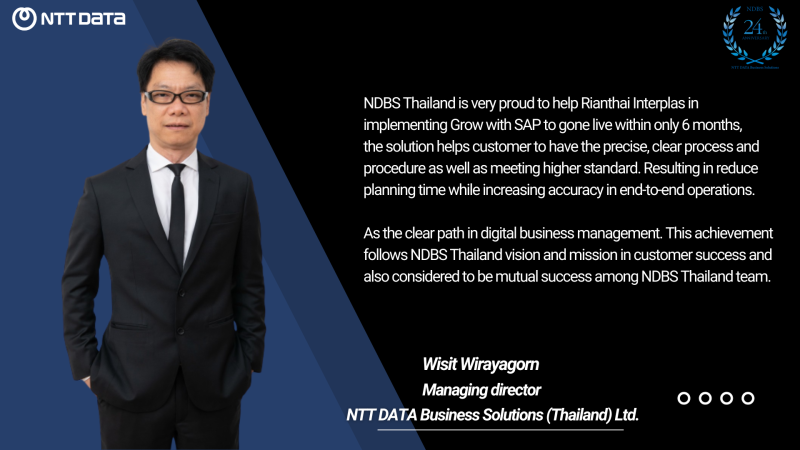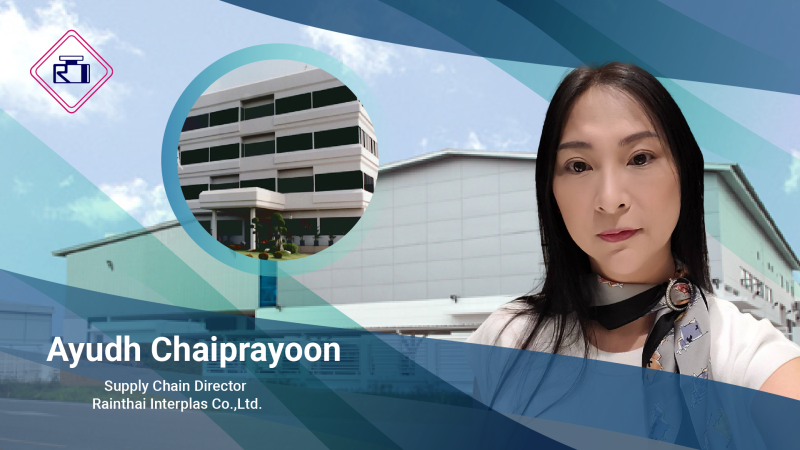Over the past 4-5 years, there has been a noticeable transformation in the packaging of various products in Thailand. This shift initially involved increased diversity and later extended to prioritize the use of sustainable materials in production, leading to more appealing packaging designs for everyday consumer products.
Rianthai Interplas Co., Ltd. is among the companies driving a significant transformation in the packaging industry. Khun Ayudh Chaiprayoon, the Supply Chain Director of the company, delved into the background of this transformation and outlined the strategies for implementing ERP systems to align with current and future business needs.
Exploring Rianthai Interplas — Thailand’s Leading Packaging Manufacturer for Cosmetics, Food, and Pharmaceuticals
According to Khun Ayudh, Rianthai Interplas Co., Ltd. was established in 1961. With over 62 years of operation, the company has consistently contributed to the production of packaging for various products in Thailand, especially global brands such as P&G, Colgate, and Watson – brands that many may recognize and regularly purchase from in their daily lives.
The packaging produced by Rianthai Interplas extends beyond domestic use in Thailand; leading global brands also source packaging materials from them for use in other countries worldwide. Therefore, the significant role of Rianthai Interplas lies in being a versatile packaging manufacturer, meeting diverse needs both within Thailand and across various countries globally.
The company’s packaging is primarily made from plastics such as PET, PETG, HDPE, and PP. Positioning as a one-stop solution provider, Rianthai Interplas also offers comprehensive services, including design, label customization, and labeling. This holistic approach has led to the continuous growth of Rianthai Interplas as a comprehensive service provider.
For more information about Rianthai Interplas, please visit the company’s website: http://www.rianthai.co.th/.
Rianthai Interplas Navigates the Changing Landscape of the Packaging Market with Adaptation to New Business Models
Khun Ayudh discussed the trends in the packaging manufacturing industry that have evolved over the past few years, influenced by three primary factors.
The first factor is the growing competition among Fast-Moving Consumer Goods (FMCG) products with various brands, which has driven brands to seek more distinct and unique product identities on store shelves, resulting in an increased demand for more diverse packaging designs. Unlike the mass-produced packaging designs in the past with extended production planning, each product, even within the same brand, now requires unique packaging designs under shorter production time, resulting in more complex and intricate operational processes.
The second factor is the direct impact of the COVID-19 pandemic on consumer product consumption patterns. Rianthai Interplas was compelled to develop new packaging solutions for products such as hand sanitizers, alcohol gels, and more. Although the situation is gradually returning to normal, the aforementioned event has been a crucial lesson for the business, contributing significantly to the growth of Rianthai Interplas.
The last factor is the emergence of sustainability trends. While this trend gained momentum in Thailand only in the past 1-2 years, Rianthai Interplas began studying it as early as 2018. This early initiative allowed the company to offer new packaging solutions aligned with customers’ sustainability goals, incorporating recycled plastic pellets from general sources or household waste. This aligns with the continuously growing market for sustainable packaging.
All these factors have necessitated Rianthai Interplas to undergo continuous adaptation. The company has shifted from being a factory that produces packaging based on individual brand orders to becoming an industry leader. This transformation was accomplished through the study and research of new materials aligned with future market trends. The company has also developed innovative packaging designs to offer to global brands, thereby creating new value for Rianthai Interplas and distinguishing itself from its competitors in the industry.
Rianthai Interplas Embarks on Major Business Management Transformation to Meet Growing Complexity
Khun Ayudh addressed the significant transformations occurring in the company’s Enterprise Resource Planning (ERP) system. Over the last two decades, the company has utilized two different ERP systems, each encountering its set of challenges:
- The initial ERP system was well-suited for the business operations of the past but struggled to adapt to the complexities of the current business environment.
- The former ERP system had limited capabilities, requiring the integration of various additional business applications. This made it challenging to implement changes and updates effectively, resulting in difficulties in managing and maintaining the system.
- The ERP systems were deployed on internal servers, requiring an in-house IT team for maintenance. This configuration incurred expenses associated with hardware maintenance, software licenses, and regular hardware upgrades. Moreover, issues such as data backup and cybersecurity needed constant attention.
To address these challenges, Rianthai Interplas has established precise criteria for a new ERP system: a flexible system capable of handling complex business processes; diverse functionalities within a unified platform; and a cloud-based ERP solution to simplify system management and reduce complexity in the infrastructure maintenance.
Migrate ERP system to Grow with SAP – Comprehensive Solution to Meet All Requirements
The decision to migrate the ERP system to Grow with SAP (SAP S/4HANA Cloud, public edition) was eventually made after careful consideration and evaluation with the following reasons:
- Support for Complex and Flexible Business Processes
Grow with SAP accommodates the company’s intricate and flexible business processes, aligning with the changing needs of Rianthai Interplas.
- Comprehensive Capabilities
The system offers comprehensive functionalities, allowing operations across all departments within a single platform, and consolidates diverse systems into one, simplifying the company’s IT landscape.
- Cloud-Based Infrastructure
By moving to the cloud, the company eliminates the need for an in-house IT team to manage its hardware, software, cybersecurity, and backups. This shift allows the IT department to focus more on proactive tasks and efficiently manage strategies related to machinery and IoT.
- Best Practice Templates
SAP provides pre-configured templates and data management from the same industry globally, enabling Rianthai Interplas to immediately implement international best practices in its operations.
- Cost Evaluation and Predictability
The ERP system’s costs are straightforward, with annual fees covering all aspects of usage. This predictability helps the company plan its budget effectively without unexpected expenses.
Furthermore, executives believe the accessibility of accurate and trustworthy business data from any device, anywhere and anytime significantly enhances business decision-making by providing rapid and precise insights.
One significant advantage of SAP S/4HANA Cloud, public edition, is its automated production planning capabilities. Unlike the previous ERP system, which required manual evaluation of materials and production schedules, SAP S/4HANA Cloud can comprehensively analyze data, streamline processes, and enhance accuracy and efficiency at every step, from material reservations and purchase requisition approvals to production planning and execution.
NDBS Thailand as SAP Implementer: Fast Installation, Smooth Operation
In this Grow with SAP project, Rianthai Interplas chose NTT DATA Business Solutions Thailand (NDBS) as its partner. With the excellent support in both business and technology consulting provided by NDBS, the successful system implementation took only just six months, involving process adjustments and migration to SAP S/4HANA Cloud, public edition, which went live in July this year.
Since going live, Rianthai Interplas has encountered minimal issues with SAP, only identifying minor points in actual work that can be promptly addressed. This positive outcome results from NDBS’s deep understanding of Rianthai Interplas’s business needs during the system implementation phase. The NDBS team efficiently pinpointed the accurate business requirements, ensuring that the installed system fully covers all essential aspects of the business needs.
Hence, in the past 2-3 months, Rianthai Interplas has fully utilized SAP S/4HANA Cloud, public edition, with all the required functionalities. There is no need for additional systems to enhance capabilities, leading to a significant reduction in business complexity. The business now benefits from real-time updated business data readily available for decision-making at both the operational and management levels.
The professional work of NDBS has played a crucial role in the successful completion of Rianthai Interplas’s major ERP project. Implementing Grow with SAP (SAP S/4HANA Cloud, public edition) has facilitated effective collaboration between NDBS and Rianthai Interplas in transforming its business processes to meet global standards simultaneously.
Executive Guidance: Collaborate with IT for Optimal ERP System Alignment
Khun Ayudh concluded with two important lessons for business executives in the same or related industries:
- In the past, business management often revolved around evaluating numerical data and making decisions. However, in today’s business landscape, working closely with the IT department ensures that businesses have technology tailored to their operations. This collaboration enables executives to comprehend the origins of diverse data sets, facilitating precise and rapid decision-making. It minimizes dependency on others and optimizes the value of technology investments.
- Developing IT strategies should be closely aligned with the business’s future vision. Anticipating emerging trends and evolving industry demands over the next 5-10 years allows businesses to adopt a forward-thinking approach. This ensures the identification of technology solutions that not only address current challenges but also guarantee alignment with the future, providing the flexibility for the business in the years ahead.

